 |
Consequences of Vatican II
The Rimini Cocktail
Anne Erickson
The annual meetings in Rimini, the largest summer cultural-religious festival in Italy, began in late 1970, and were formalized in 1980. They are sponsored by one of the new Catholic lay ecclesial movements, Communion and Liberation (CL), founded by Msgr. Luigi Giussani trying to attract the conservative reaction to the student revolts that swept Italy in 1968.
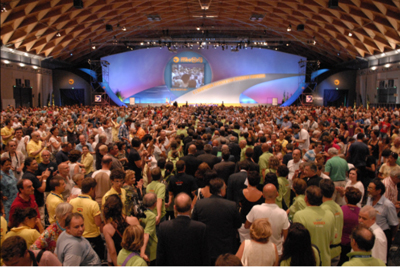
The interconfessional Rimini Festival draws thousands of persons with the blessings of the Catholic Hierarchy |
Communion and Liberation is founded on a mystic-communitarian notion of the Church, inspired by Fr. Urs von Balthasar, Card. Henri de Lubac and their follower Fr. Joseph Ratzinger. The Liberation it preaches is a moderate Liberation Theology of a center-left bend that believes, like the modernists, that each person receives a “revelation” of God that becomes explicit by an “encounter” with Christ. As each person responds to this “encounter” and “revelation” and communicates them to the others, he achieves both communion and liberation.
The Rimini encounters have been anything but conservative. They bring together persons of different faiths and cultures to value everything “good and beautiful” present in those false religions. Every year political personalities, managers, representatives of different religions and cultures, intellectuals and artists, athletes and protagonists of the world scene visit this seven day religious-cultural event.
These “people of the Meeting” describe themselves as uniquely curious, infinitely open, and essentially tolerant. They come to Rimini to find “culture expressing itself as an experience.” Doctrinal differences are set aside to share “everything good and beautiful.” Last year’s meeting organizers boasted that 800,000 visitors from 20 nations had visited their festival.
The full blessing of Benedict XVI
This year’s 33rd Annual Rimini Meeting has been, like the ones before it, fully endorsed and supported by Benedict XVI. As always, it is highly publicized by Vatican media. The theme of the meeting was, “By nature, Man’s relation to the Infinite.” This phrase is drawn from the first chapter of Fr. Giusanni’s book The Religious Sense.
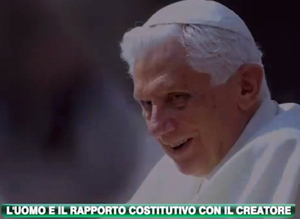
Pope Ratzinger, who has participated at past meetings, sent warm greeting this year |
According to the administrators, “The meeting seeks to illuminate the subject of ‘rights’ in all of its various aspects, the questions posed by scientific research, the challenging changes that the economic crisis has imposed on the lives of people and nations. If man is relation to the infinite, then, only this relation can provide an adequate basis for the rights of every person and every people, setting the terms for a civilized, free and dignified society.
One need only review the calendar of daily programs from the Rimini Meeting to understand its progressivist and dangerous agenda.
There was an opening Mass followed by a week of film and art festivals; music concerts featuring rock n’ roll, jazz and funk; dance performances, including a flamenco troupe performing "spiritual dance." The numerous sessions included topics like ‘An Economy Based on Shared Responsibility & Cooperative Experience’; ‘Global Economy, Penalty or Valorization of Europe’; ‘Environment, from Exploitation to Preservation’; ‘Islam Today, between Education and Reason.’ Then there were lectures on ‘The Resurrection’, ‘Evolution’ and, of course, “Religious Freedom’.
Tolerance, equality & participation
The Opening Encounter titled ‘Young Protagonists for Development, featured Giorgio Napolitano, President of Italy, who thanked the Rimini Meeting and its leaders for their understanding of and dedication to furthering a new translation of the motto liberty, equality & fraternity. Indeed, Napolitano said:
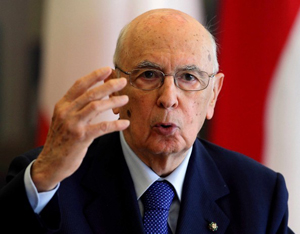
Napolitano paid tribute to liberty & tolerance |
“The topic chosen, ‘The Nature of Man and His Relation with the Infinite’, readily reveals the aim to interpret and promote social commitment in the light of the highest spiritual references and fundamental values of justice, tolerance and participation. The broad spectrum of topics on the agenda reflects the keen awareness of a shared responsibility with regard to those principles of equity and solidarity essential to safeguard the general interests of a collectivity and to re-launch sustainable and long lasting growth.”
The session continued with a lecture on the many problems facing all levels of the education systems in Italy and Anglo-Saxon countries and how supposedly unfair and discriminatory these systems are to the poor and less fortunate. One could not help notice the Marxist tone and gestures of the speaker as he conveyed his message.
Rock & erotic dance
Since the focus of this year’s meeting was culture, the schedule was dotted liberally with dance, including the aforementioned flamenco performance, as well as acrobatic dance performances.
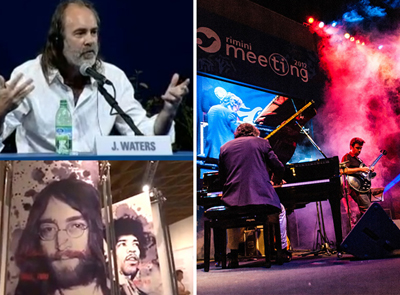
John Waters, upper left, organized the rock exhibition and praised the music; below, more modern dance and acrobatics
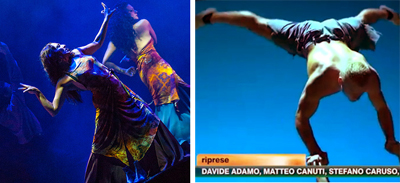 |
In addition, rock music had a strong presence at Rimini. A rock exhibition, curated by John Waters, an Irish music critic, was titled “Three chords and the desire for Truth. Rock n' roll used to seek the infinite.” Waters pretends that the infinite explains the sacred dimension of rock, how the music began “as a cry from the heart of man - the blues - and so, at its best, it remains.”
Many rock stars and bands were featured at the Rimini meeting: Muddey Waters, Hank Williams, Leonard Cohen, Joni Mitchell, U2, Amy Winehouse, Patti Smith, The Velvet Underground, Coldplay, Mumford and Sons and more.
“I would say that, far from being ‘the Devil’s music’, rock n' roll remains the most potent artistic medium in modern culture for engaging with reality in its totality, as Don Giussani persistently told us to do,” Waters explained.
Thus, the Rimini religious-cultural festival, so dear to Benedict XVI, can be summarized as follows: a modernist-progressivist event with an inter-confessional tone, promoting a leftist social agenda to the erotic rhythm of rock under a mystical-philosophical pretext: the search for infinite. It is a spicy cocktail diluted in an ambience of ecclesiastical blessing, made to be imbibed by middle-class Italian youth at the end of each summer.
If you shake it before drinking it, which usually happens, the ingredients cannot be distinguished.
The Pied Piper of a false utopia
At the Rimini encounter one thing that stands out is the buoyant spirit of the people: the Bishops and imans, the priests and rabbis, the men and women from around the world all seem mesmerized by a message of supposed love and beauty that will bring everyone together in a grand happy ending.
I am reminded of a fairy tale that seems to describe the potential fate of those who are distorting what is really good, true and beautiful, as taught in the Catholic Faith. In the German fairy tale of the ‘Pied Piper of Hamelin,’ the piper deceives the parents and leads the children to a false utopia, a mountain of wickedness into which they disappear.
There are two versions of how this legend ends. One is that three children were spared and so returned to the village to tell the parents of their children’s sad fate. The other version is that the children were returned to their parents, but at a great cost. Either way, both versions end badly.
The false utopia promised by the Piped Pipers of the Rimini Encounter – sponsored by a Catholic movement - will never materialize. The Revolution makes promises of a beautiful new world emerging, based on tolerance for all and everything, including evil and error; however, as in this story, in reality they will follow the Father of Lies into a false utopia.

Posted October 3, 2012

Related Topics of Interest
 A New and Intrusive Ecclesiastical Communism A New and Intrusive Ecclesiastical Communism
 Papal Approval of the Neocatechumenal Way Papal Approval of the Neocatechumenal Way
 The Spirit of Madonna House The Spirit of Madonna House
 Is The Angelus Promoting the Catholic Left? Is The Angelus Promoting the Catholic Left?
 Benedict Praises Religious Syncretism Benedict Praises Religious Syncretism

Related Works of Interest
|
|
Vatican II | Hot Topics | Home | Books | CDs | Search | Contact Us | Donate

© 2002-
Tradition in Action, Inc. All Rights Reserved
|
 |
|